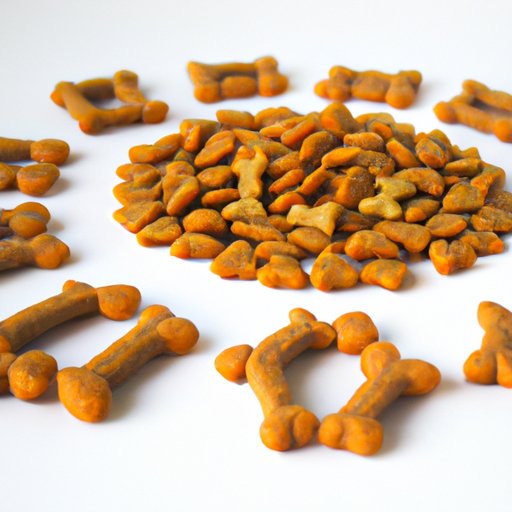Introduction
Feeding your dog is an essential part of being a pet parent. Not only do you want to make sure that your pup is getting enough to eat, but you also want to make sure that they are getting the right kind of food. In this article, we will explore how often do dogs need to eat and what to consider when deciding on a feeding schedule.
Exploring the Benefits of an Optimal Feeding Schedule for Dogs
Having a regular eating schedule for your pup is beneficial for both their physical and mental health. Regular eating habits can help dogs maintain a healthy weight, as well as reduce the risk of digestive issues. Establishing a routine can also help to reduce stress and anxiety in dogs, which can lead to better overall behavior.

What to Consider When Deciding How Often to Feed Your Dog
When deciding on a feeding schedule for your pup, there are several factors to consider. Age, size, activity level, and nutritional needs all play an important role in determining how often your pup should be fed. Here’s a closer look at each of these factors:
Age – Puppies need to eat more often than adult or senior dogs, as their bodies are still developing. Puppies should be fed three to four times a day, while adult and senior dogs should typically be fed two to three times a day.
Size – Larger breeds of dogs tend to have larger appetites, so they may need to eat more than smaller breeds. Smaller breeds, such as toy poodles and Chihuahuas, may only need to eat once or twice a day.
Activity Level – Dogs who are more active may need to eat more often than those who are less active. If your pup is a working dog or participates in agility competitions, they may need to eat more frequently than if they were just a house pet.
Nutritional Needs – Different breeds and sizes of dogs may have different dietary needs. Working dogs, for example, may require more calories and higher levels of protein than house pets. It’s important to talk to your veterinarian about your pup’s specific nutritional needs.

A Guide to Feeding Dogs of Different Ages and Sizes
Here is a quick guide to feeding dogs of different ages and sizes:
Puppies – Puppies should be fed three to four times a day. This will help ensure that they are getting enough calories and nutrients to support their growth and development.
Adult Dogs – Adult dogs should typically be fed two to three times a day. This will help them maintain a healthy weight and provide them with enough energy to stay active.
Senior Dogs – Senior dogs may need to eat less often than adult dogs. Depending on your pup’s individual needs, they may only need to eat one or two meals a day.
An Overview of the Nutritional Needs of Dogs
Dogs have specific nutritional needs that should be taken into consideration when deciding on a feeding schedule. Here is a brief overview of the main nutrients that dogs need:
Protein – Protein is an essential nutrient for dogs and is necessary for muscle growth and repair. Most commercial dog foods contain high-quality sources of protein, such as chicken, beef, and fish.
Fats – Fats are an important source of energy for dogs, as well as providing essential fatty acids. Healthy sources of fat include salmon oil, flax seed oil, and coconut oil.
Carbohydrates – Carbohydrates are another important source of energy for dogs. Whole grains, such as brown rice and oatmeal, are good sources of complex carbohydrates.
Vitamins and Minerals – Vitamins and minerals are essential for keeping your pup healthy. Many commercial dog foods contain added vitamins and minerals, such as vitamin E, zinc, and iron.

Frequently Asked Questions About Feeding Dogs
Here are some commonly asked questions about feeding dogs:
How Much Food Should I Feed My Dog? – The amount of food that you should feed your pup depends on their age, size, and activity level. Talk to your veterinarian about the best amount of food for your pup.
What Kind of Food Is Best for My Dog? – The best type of food for your pup depends on their individual needs. Talk to your veterinarian about the best type of food for your pup.
How Many Times a Day Should I Feed My Dog? – The number of times you should feed your pup depends on their age, size, and activity level. Generally, puppies should be fed three to four times a day, while adult and senior dogs should be fed two to three times a day.
Are Treats Good for My Dog? – Yes, treats can be a great way to reward your pup and show them affection. However, treats should not make up more than 10% of your pup’s daily caloric intake. Talk to your veterinarian about the best kinds of treats for your pup.
Conclusion
Deciding on a feeding schedule for your pup is an important part of being a responsible pet parent. It’s important to consider your pup’s age, size, activity level, and nutritional needs when deciding how often they should be fed. There are also certain vitamins and minerals that are essential for keeping your pup healthy. Finally, treats can be a great way to reward your pup, but should not make up more than 10% of their daily caloric intake.
We hope that this article has given you a better understanding of how often do dogs need to eat and what to consider when deciding on a feeding schedule. Remember, it’s always best to talk to your veterinarian about your pup’s specific needs.
(Note: Is this article not meeting your expectations? Do you have knowledge or insights to share? Unlock new opportunities and expand your reach by joining our authors team. Click Registration to join us and share your expertise with our readers.)
